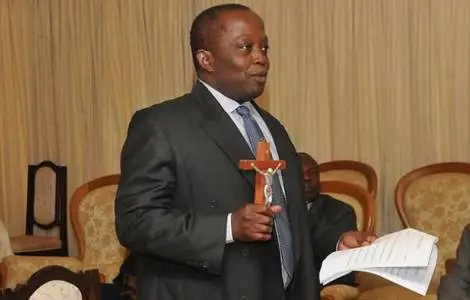A member of the Operation Recover All Loot (ORAL) Committee, Daniel Domelevo, has defended the committee’s operations against criticism, asserting that anyone who believes the committee is acting unlawfully should take their grievances to court.
Speaking on Joy News’ Upfront on Wednesday, January 15, Domelevo emphasized that ORAL’s activities are entirely lawful, with the sole purpose of gathering data to support the executive in its efforts to address corruption.
“Let me be very clear,” Domelevo said. “We are working, and yet we are being told we are operating illegally. The courts are open. If anyone thinks we are unlawful, they should go to court. Let the court tell us, ‘Oh, guys, you cannot even collect information when people bring it to you.’ If that happens, we will shut down and go.”
Domelevo rejected claims that ORAL is overstepping its mandate or interfering with the work of other anti-corruption bodies. “We are not even inviting anybody,” he pointed out. “The publication came from the office of the then president-elect, inviting people to bring information to us via hotlines, websites, or email. That’s all we are doing. The issue of inviting anyone does not even arise.”
Addressing the backlash against the committee, Domelevo suggested that the criticism stems from fear and hypocrisy. “The best form of defense is an attack. Anyone who thinks this may lead to them being exposed will definitely attack,” he said, adding that there was inconsistency in the way similar initiatives were viewed in the past.
He pointed out that in September 2017, senior minister Yaw Osafo Marfo announced the engagement of foreign firms to collect data, investigate, and assist with prosecution, which was accepted without issue. “But now, a simple team collecting data is a problem. That is the hypocrisy we have in this country.”
Domelevo further humorously suggested that without clear legal prohibitions, trivial matters could be arbitrarily deemed unlawful. “Until something is prohibited by law, it’s lawful. Otherwise, one day you will say, ‘Daniel, you are being unlawful by wearing a smock into the studio.’”
He reiterated that ORAL’s work is voluntary and designed to assist the president in making informed decisions on corruption-related cases. “We collect data and hand it over to the president. The president may then decide to refer it to the appropriate body—be it EOCO, the police, or the Office of the Special Prosecutor. That’s all we do,” he explained.
In a firm yet composed tone, Domelevo concluded by urging critics to pursue their concerns through the proper legal channels rather than making unfounded accusations. “If we are working unlawfully, go to court. Until then, we will continue doing what we are doing—lawfully and transparently,” he asserted.


